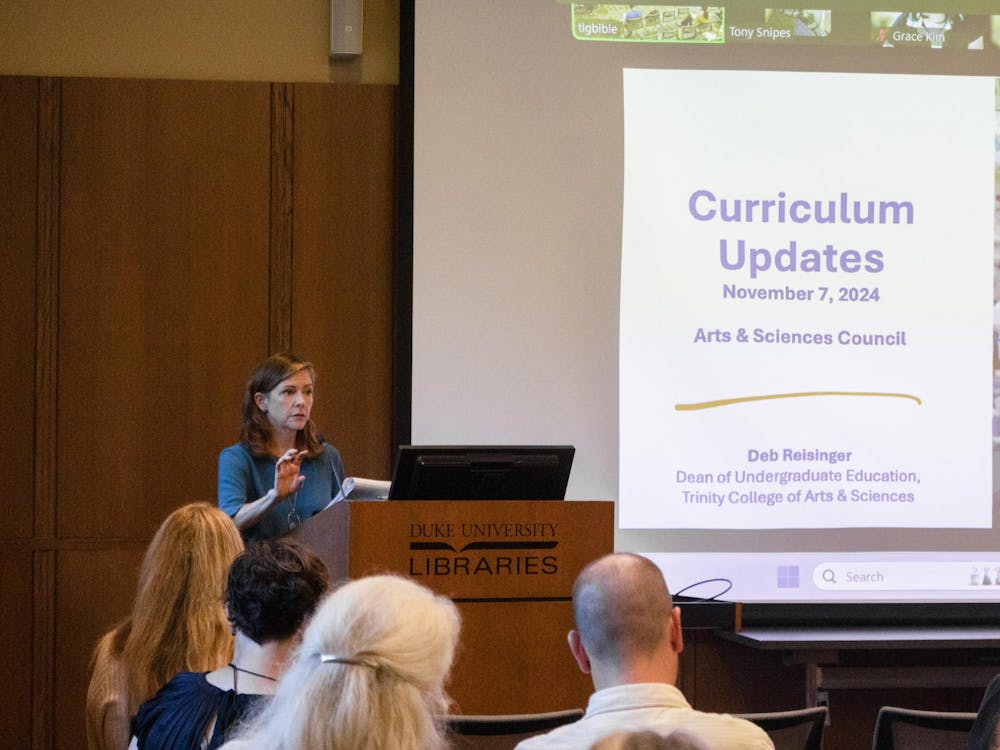Arts & Sciences Council discussed the implementation of Constellations and potential reform ideas for the Short-Term Incapacitation Forms (STINFs) during its Thursday meeting.
Constellations progress
Constellations, a component of the new curriculum for the Trinity College of Arts and Sciences passed in April, are a set of three interconnected courses that explore a certain topic from varying perspectives.
In total, 17 Constellations proposals have been submitted, involving 87 faculty from 40 departments and programs, according to Deborah Reisinger — Trinity College of Arts and Sciences dean of undergraduate education, interim dean of academic affairs and professor of the practice of Romance studies — noting that “every single department and program at Duke is represented.”
The Constellations program is meant to complement the already existing Focus program, which allows students to live and take classes together during their first semester at Duke. Reisinger shared that next fall, the University will offer 20 Focus clusters that will accommodate roughly 500 students, and 17 Constellations that will accommodate about 900 students.
“We're working with faculty now to shape questions around the topics that will be sort of like larger, compelling questions that we think will draw in students,” she said, specifically mentioning the interdisciplinary nature of the program.
STINF phaseout feedback
During its Oct. 11 meeting, the Council floated the idea of phasing out STINF — a form that allows students to request an excused absence or extensions on assignments due to short-term illness or injury.
According to Denise Comer, chair of the Arts & Sciences Council, there has been a “significant increase” of students submitting STINFs over the past few years.
Faculty who support STINFs point to how it simplifies and automates communication between students, deans and professors on health issues. Faculty against the form argue that it has led to student misuse — with significant increases in STINFs around deadlines or exams — and requires unnecessary information.
Different faculty presented surveys of their departments on STINF, finding broad support for its continuation.
Jim Parise, associate professor of the practice of chemistry, found that respondents to his survey were unanimous in support of keeping STINF, noting that “it serves [its] utility” and that “nobody said get rid of it.”
A survey of the neuroscience department found that 93% of faculty found STINF to be “useful,” according to Ruth Day, associate professor psychology and neuroscience. A survey of the history department by Professor of History Thomas Robisheaux also showed similar results.
Some faculty members felt that it was unnecessary for students to provide specific explanations when communicating with professors about health issues.
“I'm not there to judge how sick somebody is and I don't want to,” Parise said. “If a student thinks that they're sick enough, that's fine with me.”
He highlighted a suggestion to modify the “reason” area of the form to a simple checkbox which requires fewer details.
Senior Katie Kotler voiced concerns that she’s heard from students to the Council, saying the primary issue concerning students was that phasing out STINF could create inconsistency of policies between classes.
“Students won't have something to land on, won't have a viable alternative, and that's causing a little bit of panic whether we like it or not,” she said.
Get The Chronicle straight to your inbox
Signup for our weekly newsletter. Cancel at any time.

